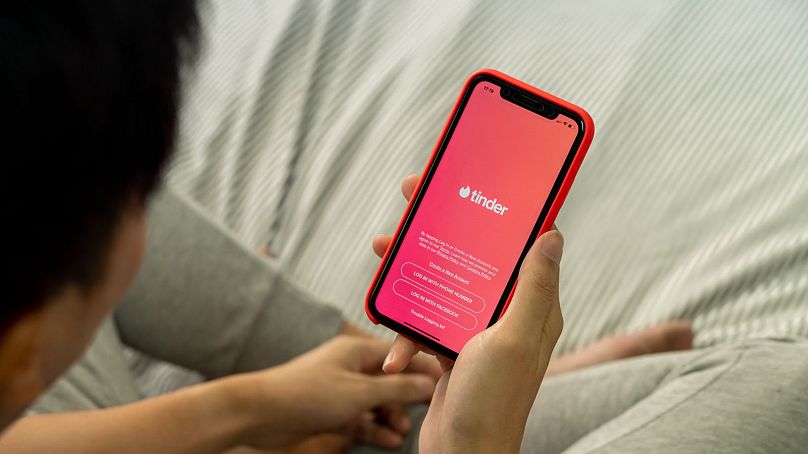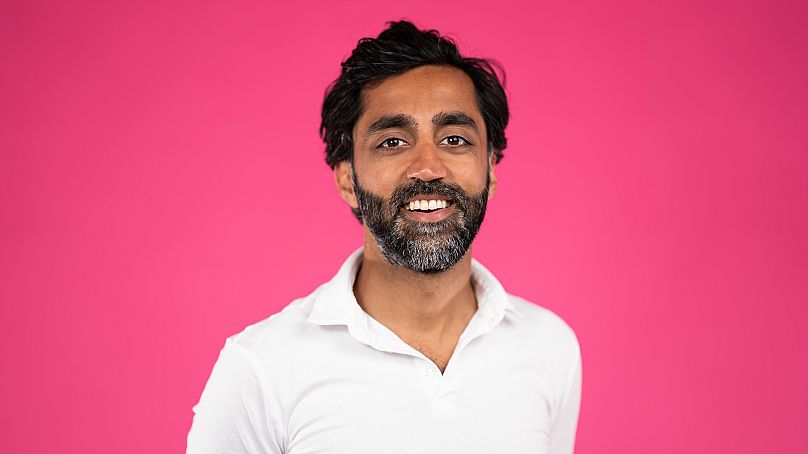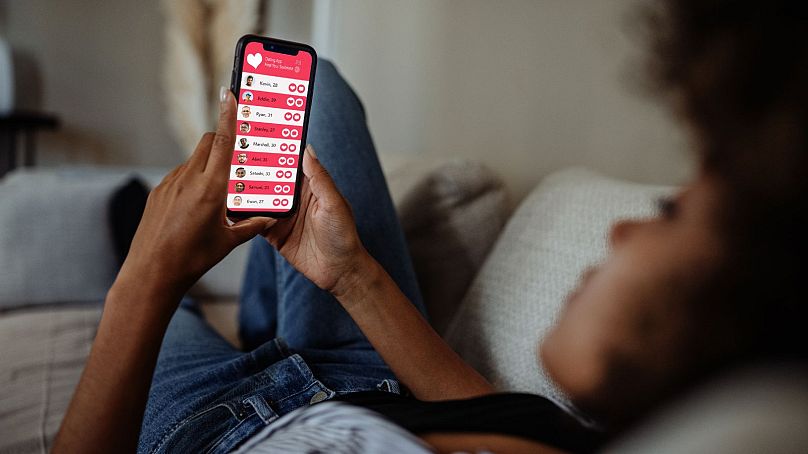It's been just over a decade since dating apps took over our phone screens but signs suggest most people are growing tired of traditional digital dating and are starting to look elsewhere for love, like apps which match mutual interests.
Movies would have us believe that falling in love happens in lifts, Ikea showrooms, on top of the Empire State Building or aboard doomed ocean liners; eyes meeting and life pausing as everything suddenly slots into place to the swell of a swoony soundtrack.
While the world is indeed a bubbling pot of chance connections, many of today’s great love stories hope to humbly begin via a mobile phone screen.
Once an intriguing novelty, dating apps came to prominence in the early 2010s, with two of the most popular, Tinder and Bumble, emerging in 2012 and 2014 respectively.
For full disclosure, I have never used a dating app.
In a long term relationship throughout my twenties, I instead observed their rise from the sidelines, listening to my friends speak excitedly about matches, and watching them swipe through images of men as casually as contemplating kettles in a catalogue.
It was a strange but refreshing thing.
When my dad met my step-mum through Match.com in the mid-aughts, he blush-faced lied to people that they’d bumped into one another at a work conference. Any past stigmas have largely been erased with the ubiquity of the apps, a presence on which is now an expectation for singletons.
In an increasingly isolated digital age where we use our phones for everything from banking to ordering burgers, apps have become the main way to meet potential partners; relationships built upon flurries of instant messages, rambling voice notes and ‘likes’.
But this societal shift in how we date and view relationships has come at a cost. Now bloated with users and burdened by cliches, the apps have long lost any sense of playful possibility; hope replaced with an obligation haunted by disillusionment and fatigue.
Tired of Tinder, burnt out by Bumble
“An endless, frustrating stream of small talk, ghosting, hook-up fuckbois, catfish scammers and bored polyamorous looking to expand their couple or group,” Ria Fend, a 38-year-old actor and graphic designer based in London, says of her time on dating apps.
“The illusion of infinite choice is dehumanising and too easy for people to lack accountability and treat you badly.”
Ria is far from alone in feeling burnt out. The superficial mechanisms of dating apps, which flatten connection to a series of somnolence-inducing swipes and profiles filled with unimaginative pop culture quotes, have lost their shine.
Then there is the never ending list of negative experiences, from bots and scammers, to ‘ghosting’ and ‘situationships’.
Women in particular are often subject to inappropriate messages, with a third called abusive names or pursued by men after saying no, according to a 2020 Pew Research study. This has led to the creation of Facebook groups where women can warn others of men that have exhibited bad behaviour.
It all feels like we're getting dangerously close to living out a scene from the 1987 movie Amazon Women on the Moon, in which Rosanna Arquette prints the entire dating and sexual history of her blind date: "On seventeen occasions you lied to women, telling them you were really into sushi and Meryl Streep movies."
It’s no surprise, then, that a growing number of users are deciding to swipe left on it all. A 2023 study by US news outlet Axios and research firm Generation Lab found that 79 per cent of college students were opting for old school in-person dating instead.
Ria’s in agreement: “I’ve recently opted to ditch the apps and get out to new meet-up groups and socials to expand real life organic connections in the hope of finding someone genuine who also wants a relationship.”
Much like a lot of social media platforms, one of the main reasons dating apps have become so unappealing is their attempts to monopolise the market by being everything to everyone all at once, sacrificing user experience for greedy data guzzling, until they burst.
Writing for Wired, journalist Cory Doctorow coined a term for this: 'enshittification'. Under the lures of capitalism, once buzzy digital hubs are always destined to become zombie-infested shopping centres, groaning towards collapse.
Where is the love?
In response, people aren’t just going offline to find romance - they’re also turning to simpler and more specific apps, many of which aren’t meant to be for dating at all.
Take Duolingo, for example: a language app where you’re guilted by an annoyingly enthusiastic green owl to continue learning streaks. There’s not even a private messaging function, yet The Wall Street Journal recently reported that people were still trouver l'amour on there.
When I reached out to Duolingo to find out more about how this might be possible, they shared a story about a couple named Rob and Amanda, who met when one congratulated the other on their winning streaks. They’re married now.
Other hobby apps being used for romance include exercise tracker Strava and film-focused Letterboxd, where two movie lovers went viral in 2021 after starting a relationship over a shared love of David Fincher’s ‘Mank’.
The more solitary set-up of these interest-based apps renders such success stories the exception, but their use in this way highlights a huge gap in the market.
There’s clear demand for more niche spaces, where the pools of people are smaller and interests more genuine, led by creativity and activity rather than soulless CVs that are all tell and no show.
Some start-ups are already catching on to this idea, like Turn Up, a music-based dating app where users lead with their favourite bands instead of the usual ‘about me’ spiel.
There was even a dating app dedicated to cat lovers called Tabby on ‘Shark Tank’ last year, but its lack of success would suggest people weren’t ‘feline’ it (this is why I'll never get any matches).
What is the future of dating apps?
A former investment banker, Shahzad Younas launched the Muslim dating app Muzz in 2015 after noticing the lack of decent options available for his religion. Since then, it has grown to become the leading Muslim dating app, reaching over 10 million users across the world in 50 languages.
A major part of its success is down to the app being unashamed about what it is, says Younas, but also the cultural differences of dating as a Muslim.
“Generally speaking, Muslims don't date, we marry,” Younas tells Euronews Culture.
“On the mainstream apps, for the most part, you've obviously got some people who are serious, but a lot of people who are just happy to date, happy to hook up, that kind of stuff. And that's the kind of culture of the apps. Whereas for us, it's the complete opposite.”
The app is very specific in its approach to matching people, asking them directly how often they pray, how religious they are and when they are looking to get married.
Its largely European demographic, with the UK and France comprising its biggest audience, also means that users are more willing to travel than the hyper-local nature of Tinder and co.
“You have a lot of people [app users] who don't really have much in the way of a distance or a country filter. They're happy to travel, and happy to effectively swipe people in different countries within Europe,” says Younas.
With Match Group (owner of Tinder, Hinge, Match.com and more) shares falling 40 per cent in the past year, the success of apps like Muzz suggest the future of dating apps lies in a more targeted approach that fosters directness and encourages non-gamified communication.
“For me, that's the real way of looking at this market. How do you make this a more natural experience? Because I'm thinking, in ten years or five years, will people still be swiping? I don't know. I don't know if that's the best way. There's definitely an element of fatigue in it,” says Younas, who’s looking to make online dating feel less forced.
“People often say that Instagram is the world's biggest dating app, because people are looking at content and sliding into DMs and getting to know people that way, which I think is somewhat of a more natural way than literally swiping people. And so one thing we're looking at is, how do we actually build a community over and above a community that's just looking to date and marry?”
Interestingly, Younas has also found that their free video and voice calling feature has helped people to find successful matches through filtering out any stagnant chatter and cutting straight to who’s serious. Over half of calls on Muzz are started by women.
“A lot of women don't want to give their phone number out, so it allows them to be secure on the app and have a call. And if they're not interested, great. You get a better idea of someone on a voice or a video call, which is almost like the first step before meeting in person.”
While the future of dating apps remains uncertain, we’re at a tipping point where the majority of peoples’ needs aren’t being met, leading most into a demoralising cycle of delete, reinstall, delete.
“It’s just a lot of effort. You put in a lot of time to just get a date in place. It’s like a full time job,” one friend tells me.
But we're also a hopelessly romantic species, and so long as hope remains, we'll keep on swiping, past all the grinning group shots and try-hard ironic poses, clinging to the chance of connecting with that special someone. It's no Sleepless in Seattle, but at least our fates are likely to turn out better than Titanic.
Personally, I'll be returning to Duolingo. Que Será, Será.














